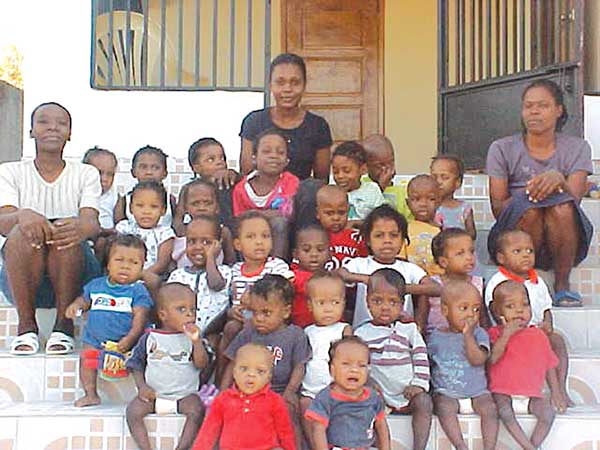By Cornelia Walther
LES CAYES, Haiti, CMC – “I want to become a professor one day,” says Sabrina. The little girl is seven years old and has a smile that radiates from ear to ear. Full of energy, she lists her favourite topics at school – reading and maths – and her favourite movie – Walt Disney’s ‘Frozen’. Nothing in her sparkling demeanour hints at the shadows of her past.
Marie-Denise Augustin is one of 16 certified foster families in Les Cayes situated in the south of Haiti. Five years ago she opened her home and heart to little Sabrina. The affection she has been lavishing on her ‘daughter’ ever since is mirrored by the girl’s confidence. “She is such an incredible child. Wherever she goes, everyone loves her,” says Marie-Denise.

The Foster Family Programme is a joint initiative by the government’s main child protection agency the Institute of Social Well-Being and Research (IBESR), the NGO Terre des Hommes and UNICEF.
Marie-Denise was one of the first women to provide a home to children who have been separated from their biological parents. Rooted in the belief that the best place for a child is with a family or a setting that emulates it, UNICEF supports the extension of the foster family network throughout Haiti, offering a sustainable and appropriate alternative to the institutionalization of children.
Since 2014 this programme includes a formal certification process that each foster family must undergo. Foster parents like Marie-Denise receive technical support and guidance, not payment. Their action is based on compassion and love, not financial interests.
Across the country an estimated 30,000 children between 0 and 17 years currently live in over 700 institutions. Although they are called orphanages, the majority of the children they house have at least one living parent.
“Parents who leave their children at institutions do so because they do not have the means to take care of them,” explains Geraldine Alferis, child protection specialist with UNICEF Haiti.
This is what happened to Sabrina. Her biological mother left her at the main hospital in Les Cayes where the malnourished toddler was found by UNICEF’s partner organization Terre des Hommes.
“In collaboration with the IBESR we continuously monitor clinics and health centres to identify children like Sabrina who have been separated from their parents. Our aim is to place these children in a safe family-like context early on, while seeking to trace the biological parents and, if possible, establish conditions for reunification,” says Marie PauleGelus who manages the foster family programme at Terre des Hommes in Les Cayes.
In the case of Sabrina, such reunification didn’t happen. Her mother left without a trace and has not sought to get back in touch.
Two out of three Haitians live on less than US$2 a day. For many, every day is a struggle to survive. In this context shocks such as an illness, the loss of employment, a divorce or a natural disaster – such as the recent Hurricane Matthew – disrupt the already fragile balance, depriving families of even the basic minimum that had allowed them previously to make ends meet.
During the weeks following Hurricane Matthew’s devastating arrival on 4 October, UNICEF has continued to identify unaccompanied minors, track families and support referrals to foster families and partner organizations. Children without appropriate care were provided with assistance and attention.
“We are working on two levels, by supporting organizations such as Terre des Hommes on the one hand, in the immediate response to children in need; and on the other hand by collaborating with national and local authorities in establishing mechanisms to prevent the voluntary separation of families and institutionalization of children,” explains Geraldine Alferis.
As of 5 November 2016, UNICEF and its partners have reached 3,805 children with psychosocial activities both in shelters and residential care centres. Efforts to prevent the institutionalization of children and voluntary separation in the current crisis setting are ongoing, with efforts targeting 23,000 parents in hurricane-affected communities, at public stations and commuting areas.
“There are so many children in need now. My home is open,” says Marie-Denise thoughtfully. The roof of her house and parts of the interior have been damaged, yet her willingness to help is intact. “I couldn’t take in additional children for the long-term, but I can at least offer them a safe place of transition.” Her face is marked by concern and compassion.
(*UNICEF is working with the government and partner organizations to support a foster family network throughout Haiti. Following the recent Hurricane Matthew, efforts are being made to prevent the institutionalization of children and voluntary separation of children from their parents)





![Simón Bolívar - Liberator of the Americas [Photo credit: Venezuelan Embassy]](https://thevoiceslu.com/wp-content/uploads/2025/12/Simon-Bolivar-feat-2-380x250.jpg)



